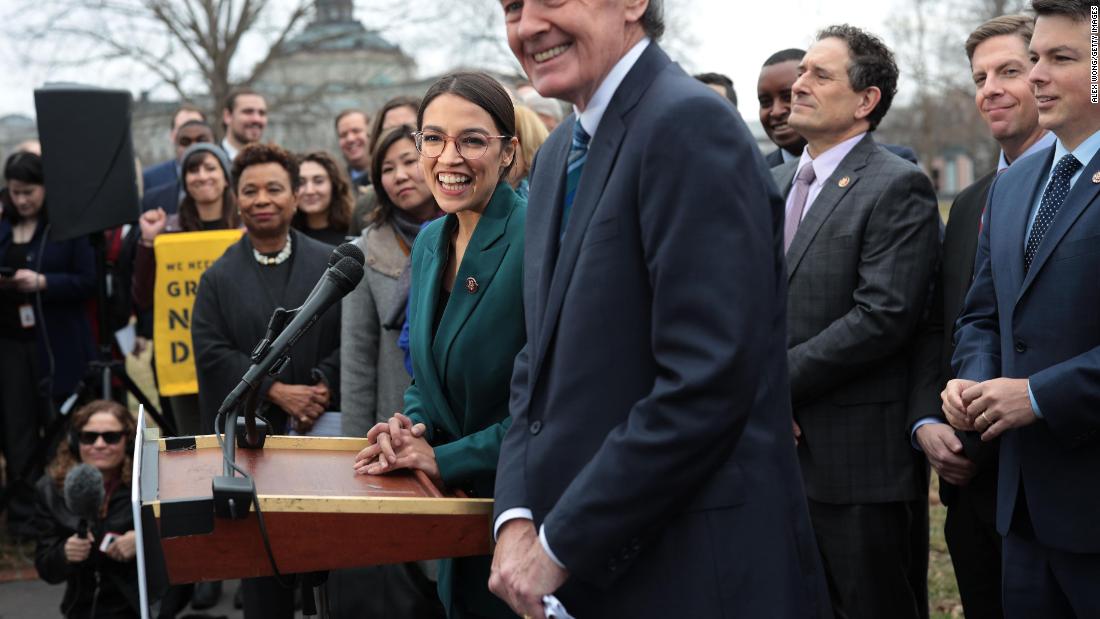
Four senators who caucus with the Democrats joined all 53 Republicans in voting "no" because they object to the far-reaching plan, which Senate Majority Leader Mitch McConnell labeled "a socialist makeover of the entire US economy."
The overwhelming majority of Democrats voted "present," because, while they are generally supportive of the ideas in the nascent Green New Deal, they were unwilling to vote for or against it before it was written into final legislative language.
Democrats were also wary of getting stuck in a political trap Republicans made clear they were laying for them: GOP leaders were trying to lure Democrats to embrace a plan Republicans believe is outside of the mainstream, and then use it against them on the campaign trail.
"The Green New Deal is chockful of utopian ideas but completely devoid of concrete plans to implement any of its overreaching policies," said Sen. John Cornyn, a Republican from Texas, who complained it is a "radical environmental policy" that includes "Medicare for all, free college, and guaranteed jobs."
"You might as well throw in free beer and pizza," Cornyn added.
Sen. Joe Manchin, a West Virginia Democrat who voted "no" Tuesday, said that he wanted to focus on "real solutions that recognized the role fossil fuels will continue to play."
"We cannot successfully address our climate challenge by eliminating sources of energy that countries are committed to using," Manchin said in a statement. "Only through innovating and developing new technologies that reduce carbon emissions will we truly make a difference."
McConnell, a Kentucky Republican, has been upfront for weeks about his intentions in forcing the vote. He wanted to put Democrats, especially those running for president, on-the-record about their support for the high-profile and controversial plan, which was authored by two progressive Democrats, Rep. Alexandria Ocasio-Cortez of New York and Sen. Ed Markey of Massachusetts.
Their plan seeks to achieve net-zero greenhouse gas emissions, secure clean air water, and a sustainable environment, create millions of high-wage jobs, switch the country's power demands so that 100% comes renewable sources, mitigate the health effects of pollution and climate change, among other goals.
Senate Minority Leader Chuck Schumer, a Democrat from New York, accused McConnell of playing "gotcha politics."
"Republicans want to force this political stunt to distract from the fact that they neither have a plan nor a sense of urgency to deal with the threat of climate change," Schumer said. "Everyone knows it's a stunt, including the majority leader himself. He put something on the floor and then votes no. What's the point of that?"
Besides the political vitriol on the floor from party leaders, there was some serious debate through the day from rank-and-file senators in both parties about climate change and the risks and rewards of doing something about it.
Sen. Pat Roberts, a Republican of Kansas who chairs the Agriculture Committee, said that just as supporters of the Green New Deal believe they have moral imperative of protecting the planet, members of the agriculture industry -- who he argued already are conservation-minded -- believe they have a moral imperative to feed a hungry country and world.
"I think all Republicans understand there is climate change. All Republicans know that human activity does contribute to it," he said. "Yes, we ought to do something. The point I'm trying to make here is that we don't want to do the wrong thing and cause a great deal of disruption in the process."
Sen. Lisa Murkowski, a Republican of Alaska who chairs the Energy and Natural Resources Committee, said climate change is felt in her state and bipartisan solutions that can be enduring are needed.
"It is important for us around here to make sure that we don't distract from those pragmatic, practical solutions. That we don't amp the rhetoric up so high that we can't get ourselves to a place where we can work cooperatively, collaboratively, to get to these solutions," she said.
Sen. Maria Cantwell of Washington, the top Democrat on the Commerce, Science, and Transportation Committee, argued that changing to cleaner technologies will be better for the US economy over the long haul even if the transition to them could be challenging.
"We can transition to cleaner fuels, we can become more energy independent, we can become more energy efficient, and doing so actually creates new jobs that are higher-waged and help us in the future," she said. "What Americans want to know is whether we can make it through this transition without doing great damage to our economy."
No comments:
Post a Comment